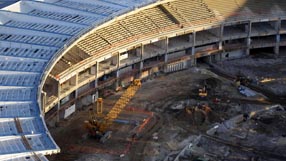FIFA: Brazil behind with World Cup preparation
MOSCOW - Brazil has fallen behind with its preparations for the 2014 World Cup and faces a battle to build new stadiums, airports and transport links in time for the event, FIFA Secretary General Jerome Valcke said on Friday.

"I won't say that Brazil started too late [but] we are not advanced in Brazil," he told an audience in Russia, which will host the subsequent tournament in 2018.
"We don't have stadiums, we don't have airports, we don't have a national transportation system in place," he said during a keynote address to a football forum in Moscow.
Brazil, the most successful World Cup nation with five victories, has been much-criticised for its preparations since winning the rights to host its first tournament since 1950.
A new stadium for largest city Sao Paulo has already been ruled out as a venue for 2013 dress rehearsal the Confederations Cup, while cost increases have hampered new building plans.
"To deliver stadiums is the most important part... it's a lot of work. The Sao Paulo stadium is definitely not a World Cup stadium and that is why it is closed," Valcke said.
Valcke, effectively FIFA's number two and widely credited with the success of last year's tournament in South Africa, told the Moscow audience that Russia should aim to be ready by 2016 - two years before the tournament starts.
He declined to comment directly on the cash-for-votes scandal that surrounded FIFA's recent presidential election, adding only that it was "nice to talk about football" for a change.
Get FourFourTwo Newsletter
The best features, fun and footballing quizzes, straight to your inbox every week.
PROFITABLE
Alexei Sorokin, chief executive of Russia's World Cup organising committee, told the forum the 2016 deadline was "absolutely realistic," despite having to build or renovate every stadium.
"We have to build a lot. We have never hid the fact that we do not have a single stadium that is up to FIFA standards," he said.
Russia has nominated 13 host cities for the event, a figure that will eventually be reduced, while estimating the total bill for new infrastructure at $10 billion.
Sorokin said the $10 billion would come from private investors as well as state funds, adding that a portion of the total had already been budgeted under existing government plans to improve Russian infrastructure.
"We are motivating stadium owners to attract as much private investment as possible. It is meant to be profitable," he said.
He played down fears about racism in Russia as "not representative of the general mood" but admitted it was "difficult to control."
Brazilian former World Cup winner Roberto Carlos, who signed for Russian club Anzhi Makhachkala in February, was the target of banana-throwing at a league match earlier this week.
And Zenit St Petersburg, the Russian league champions, were fined 300,000 roubles ($10,661.477) after a fan offered the same player a banana at a pre-match ceremony in April.
